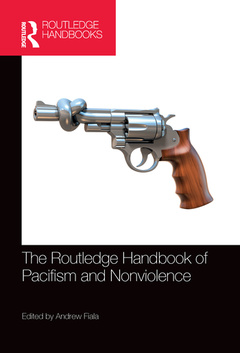The Routledge Handbook of Pacifism and Nonviolence Routledge Handbooks in Philosophy Series
Coordonnateur : Fiala Andrew

Interest in pacifism?an idea with a long history in philosophical thought and in several religious traditions?is growing. The Routledge Handbook of Pacifism and Nonviolence is the first comprehensive reference designed to introduce newcomers and researchers to the many varieties of pacifism and nonviolence, to their history and philosophy, and to pacifism?s most serious critiques. The volume offers 32 brand new chapters from the world?s leading experts across a diverse range of fields, who together provide a broad discussion of pacifism and nonviolence in connection with virtue ethics, capital punishment, animal ethics, ecology, queer theory, and feminism, among other areas. This Handbook is divided into four sections: (1) Historical and Tradition-Specific Considerations, (2) Conceptual and Moral Considerations, (3) Social and Political Considerations, and (4) Applications. It concludes with an Afterword by James Lawson, one of the icons of the nonviolent American Civil Rights movement. The text will be invaluable to scholars and students, as well as to activists and general readers interested in peace, nonviolence, and critical perspectives on war and violence.
Notes on Contributors
Acknowledgements
Introduction
Andrew Fiala
Part I: Historical and Tradition-Specific Considerations
- A History of the Idea of Pacifism and Nonviolence: Ancient to Modern
- Nonviolence and Pacifism in the Long Nineteenth Century
- Pacifism in the Twentieth Century and Beyond
- Christian Pacifism
- Peace and Nonviolence in Islam
- Philosophy of Nonviolence in Africa
- Nonviolence in the Dharma Traditions: Hinduism, Jainism, and Buddhism
- The Gandhi-King Tradition and Satyagraha
- Pacifism and the Concept of Morality
- Peace: Negative and Positive
- The Pacifist Critique of the Just War Tradition
- Contingent Pacifism
- Humanitarian Intervention and the Problem of Genocide and Atrocity
- Virtue Ethics and Nonviolence
- Personal Pacifism and Conscientious Objection
- Pacifism: Does it Make Moral Sense?
- Pacifism as Pathology
- The Triumph of the Liberal Democratic Peace and the Dangers of Its Success
- Human Rights and International Law
- Hospitality, Identity, and Cosmopolitanism: Antidotes to the Violence of Otherness
- Warism and the Dominant Worldview
- The Military-Industrial Complex
- Feminism and Nonviolent Activism
- Queer Oppression and Pacifism
- Care Theory, Peacemaking, and Education
- Becoming Nonviolent: Sociobiological, Neurophysiological, and Spiritual Perspectives
- The Death Penalty and Nonviolence: Justice Beyond Empathy
- Ecology and Pacifism
- Animals, Vegetarianism, and Nonviolence
- Children, Violence, and Nonviolence
- Peace Pedagogy from the Borderlines
Duane L. Cady
Michael Allan Fox
Andrew Fiala
Daniel A. Dombrowski
Ramin Jahanbegloo
Gail M. Presbey
Veena R. Howard
Barry L. Gan
Part II: Conceptual and Moral Considerations
Robert L. Holmes
David Boersema
Cheyney Ryan
Paul Morrow
Jennifer Kling
David K. Chan
Eric Reitan
Jan Narveson
José-Antonio Orosco
Part III: Social and Political Considerations
Fuat Gursozlu
Robert Paul Churchill
Eddy M. Souffrant
Duane L. Cady
William Gay
Danielle Poe
Blake Hereth
Part IV: Applications
Nel Noddings
Andrew Fitz-Gibbon
Lloyd Steffen
Mark Woods
Christopher Chapple
Jane Hall Fitz-Gibbon
Renee Bricker, Yi Deng, Donna A. Gessell, and Michael Proulx
Afterword: Nonviolence and the Non-Existent Country
James M. Lawson, Jr.
Andrew Fiala is Professor of Philosophy and Director of the Ethics Center at Fresno State University, USA. A former president of Concerned Philosophers for Peace, his publications include The Just War Myth (2008), Public War, Private Conscience (2010), The Bloomsbury Companion to Political Philosophy (editor, 2015), Ethics: Theory and Contemporary Issues, 9th edition (with Barbara MacKinnon, 2017), and Transformative Pacifism (forthcoming).
Date de parution : 06-2020
17.4x24.6 cm
Date de parution : 02-2018
17.4x24.6 cm
Thème de The Routledge Handbook of Pacifism and Nonviolence :
Mots-clés :
Leymah Gbowee; Contingent Pacifism; contingent; Contingent Pacifists; Duane L; Cady; Best Life; Michael Allen Fox; Vocational Pacifism; Daniel A; Dombrowski; Capital Punishment; Ramin Jahanbegloo; Jus Ad Bellum; Gail M; Presbey; Absolute Pacifism; Veena R; Howard; Christian Pacifism; Barry L; Gan; Nonviolent Social Movements; Robert L; Holmes; Vice Versa; David Boersema; Political Pacifism; Cheyney Ryan; Nelson Mandela; Paul Morrow; UN; Jennifer Kling; Younger Men; David K; Chan; Christian Pacifists; Eric Reitan; International Humanitarian Law; Jan Narveson; Contemporary Society; José-Antonio Orosco; Non-violent Resistance; Fuat Gursozlu; Military Expenditures; Robert Paul Churchill; Nonviolent Direct Action; Eddy M; Souffrant; Nuclear Disarmament; William Gay; War Thinking; Danielle Poe; Hitler; Blake Hereth; Adolf Hitler; Nel Noddings; Andrew Fitz-Gibbon; Lloyd Steffen; Mark Woods; Christopher Key Chapple; Jane Hall Fitz-Gibbon; Renee Bricker; Yi Deng; Donna A; Gessell; Michael Proulx; James M; Lawson



